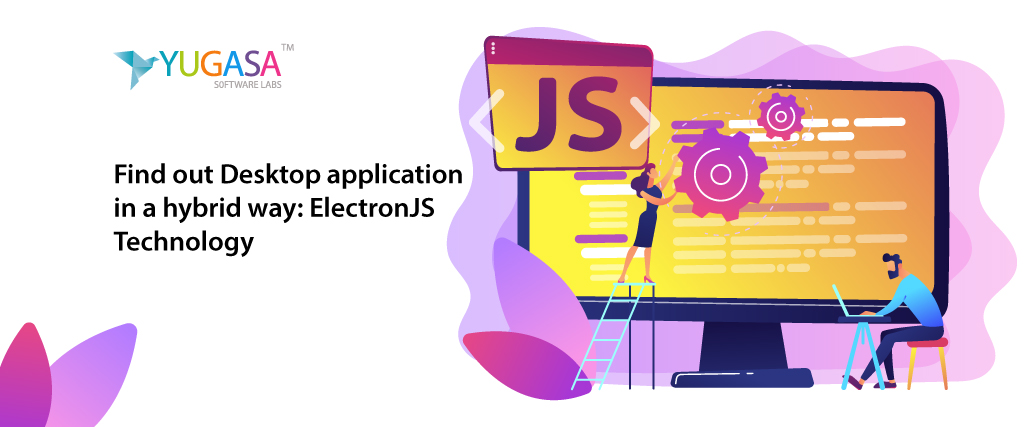Find out Desktop application in a hybrid way: ElectronJS Technology

Hybrid Desktop Application: What is a Desktop application? Desktop Applications are run stand alone on the laptops and systems. Although desktop apps are different from mobile apps because desktop apps have a different purpose to serve.
This is done to protect the interest of the users to engage in desktop applications.
The essential features of desktop applications are that the efficiency of the application is comparatively higher and also these are highly customized as per user’s requirements and flexibility, to provide the users a smooth experience.
If you are keen to know what is a desktop application? Let’s try to understand its benefits, failures, and the process of desktop application development.
The applications installed on the system’s local server are known as the desktop apps, you can install them from online websites or use the CD to install the app.
Once the app is installed, it does not require any internet connection to access, it works on the system’s local server.
Sometimes, it looks people are not able to differentiate between desktop or web applications, although they are different from each other.
The primary difference between both is desktop apps run on the local server of the computer devices and web applications only work with Internet connectivity.
However, there are different ways to desktop app development. Research about all the ways to find the best fit for you! Your choice will depend on several crucial factors, considering your budget and your deadline.
The purpose to write this article is to give you a sound understanding of the different types of apps available and to help you to make a smart, informed decision on selecting the best technology to build your app.
Hybrid Desktop Application - What is Hybrid Desktop App?
Hybrid apps are a combination of both native and web solutions, hence the name hybrid, When the code of the application is written using web technologies like JS, HTML, CSS, is called a hybrid desktop app. In this article, we go deep into hybrid app technology.
However, it is not available in the web browser, instead, it is run from a native application in its embedded browser which is invisible to the user.
For example, an iOS application uses the WKWebView to display our application, while Android would use the WebView element to perform the same function.
The code is then embedded into a native application wrapper using a solution like Apache Cordova (aka Phone Gap) or Ionic’s Capacitor.
These solutions create a native shell app which is just the platform’s web view component in which it will load your web application.
This gives you the freedom to create and publish true native applications that can be reviewed by platform app stores for sale.
However, there are some drawbacks to this option. Similarly, with the web-only application solution, the UI library has to be redesigned.
Here is where solutions like Ionic, NativeScript, Xamarin, React Native, and others are considered.
These options provide robust UI components that can be alternatively used as their native counterparts, giving you a comprehensive suite of building blocks for your application.
Is Electron JS good for desktop apps?
With an improvised runtime and the use of the right language with JavaScript and Node. js, Electron JS makes designing and maintaining the apps easier on cross platforms.
Let’s find out
the features of electron JS: Hybrid Desktop Application
1. Security
You don’t need to think much when transferring your existing application to ElectronJS as the application we are creating is a desktop application and data stays internally in the system.
Because of this feature, you can ensure data privacy. In case you need to store data in the cloud, assure whether your cloud network has enough security functions to avoid any data breach.
2. Performance - Hybrid Desktop Application
ElectronJS wins this aspect. If the right deployment is done while developing the app, ElectronJS can show some great impact in the terms of performance as compared to native applications.
ElectronJS is effective and provides more options to play-with or develop by having a single code base for all the major platforms.
3. Code and App Management
As a Developer, you need not stress about different codebases. If you find a bug on any platform, you can fix it at the codebase.
The bug will never show up again on any other platform. However, you should still keep a keen eye on the OS level functionalities to avoid discrepancies later.
4. Reusability - Hybrid Desktop Application
Using a single code base means we can use this for both web applications and desktop applications. We are, in a way, also reusing the base code across different platforms since we “code once and deploy everywhere”.
5. Cost and Time
ElectronJS will save a lot of development time and money because, for the stack we use, there are a lot of developers who can do provide value for your money.
You can know more about the Desktop application in a hybrid way in our upcoming blogs. Stay tuned with us.
We will get back to you with more knowledge and strong information about the desktop application to keep you aware of the tips, tricks, and trends.
Read More: WHAT IS ELECTRON JS? WHY SHOULD YOU USE IT?
